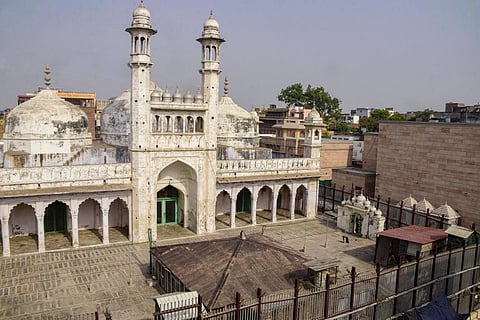

LUCKNOW: In a significant order, the Varanasi district court allowed the scientific survey of the Gyanvapi mosque premises by the Archaeological Survey of India (ASI) barring the area sealed in compliance with the order of the Supreme Court of India, last year.
The mosque's 'wazukhana' (ablution centre), where a structure claimed by Hindu litigants to be a 'shivling' exists, will not be part of the survey following an earlier Supreme Court order protecting that spot in the complex. The 'wazukhana' was sealed on the orders of the apex court in May 2022.
In May, this year, counsel for the Hindu plaintiffs had filed an application seeking a scientific survey of the Gyanvapi mosque complex, excluding its sealed area.
Passing the order of scientific survey, Varanasi district judge AK Vishvesha directed the ASI to conduct Ground Penetrating Radar (GPR) survey, excavation, dating method and other modern techniques to determine whether the present-day mosque was constructed over a pre-existing structure of a Hindu temple. The ASI was asked to submit its investigation/survey report by August 4, the next date of hearing.
The ASI director was also asked to conduct a scientific investigation to ascertain the age and nature of construction of the western wall of the mosque building, conduct a GPR survey of just below the three domes, beneath the western wall as well as the ground of all the cellars and conduct excavation if required.
Court asked the ASI director to prepare a list of all the artefacts, found in the building during the investigation specifying their contents and finding out the age and nature of such artefacts. The order also contained directives for conducting a dating exercise of the pillars and plinth of the building to find out the age and nature of the construction.
The director of ASI was also directed to investigate the artefacts and other objects of historical and religious importance existing in different parts of the building and also beneath the structure which may be found during the search exercise.
After explaining the points of investigation and methods to be adopted, the district judge cautioned the ASI director against any damage to the structure standing on the disputed land ensuring that it remained intact and unharmed.
The order contained the historical aspects mentioned by the plaintiffs in their application, details of the court-mandated survey of May 2022 and also objections of Anjuman Intezamia Masajid (AIM), the mosque management committee.
The AIM had objected to the survey, arguing that it was already conducted following the order of the court of Civil Judge senior division, Varanasi in May 2022. However, the district judge rejected the AIM objection saying the previous survey was not scientific.
Supporting his order, the district judge said: "In my view, if ASI will be directed to hold a survey and scientific investigation at the property in question and submit a report, it will help in just and proper disposal of the case and true facts will come before this court."